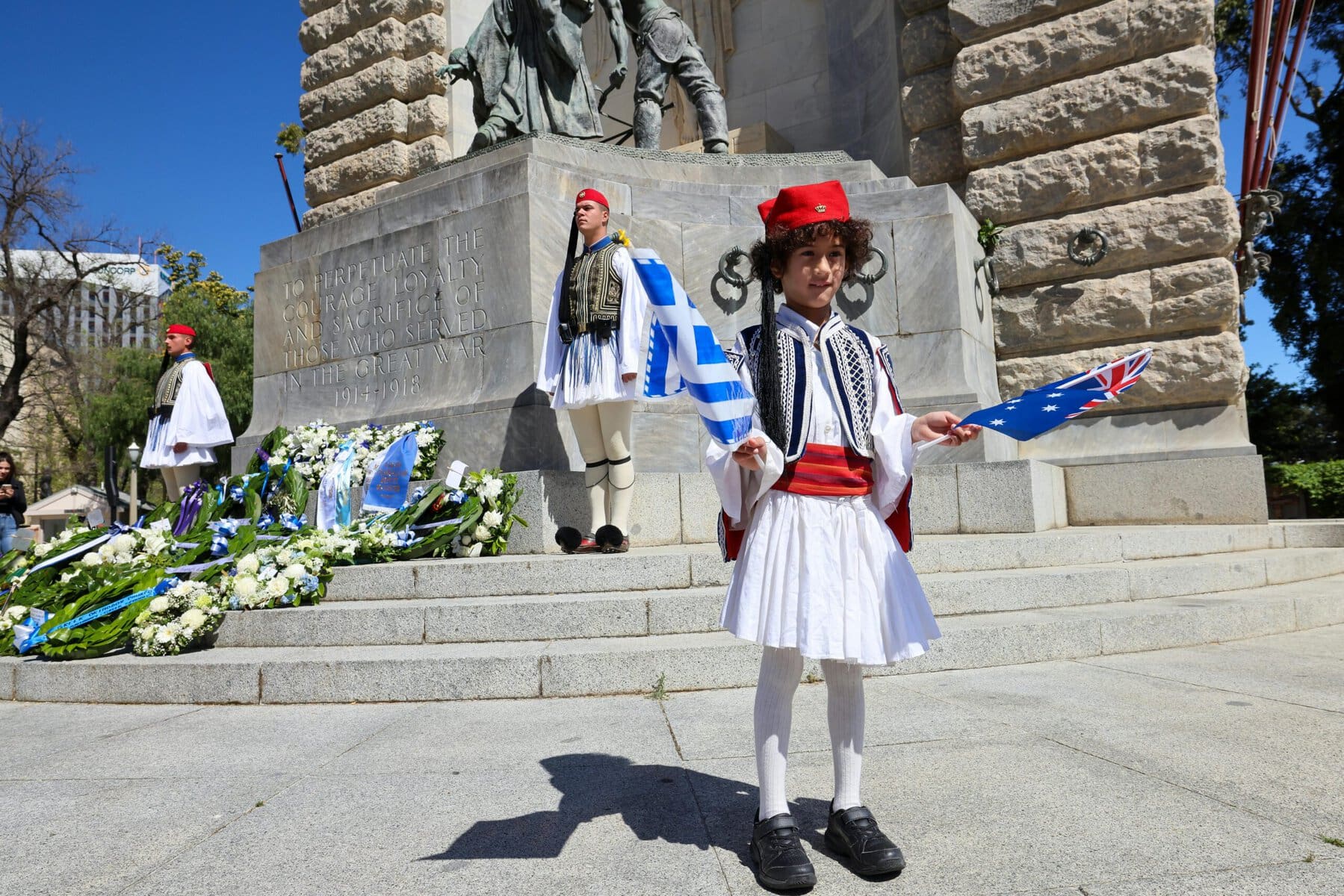Discovering Greece feels like stepping into a place where old stories mix with today’s energy, and what people wear here is a part of that tale. If you want to really get into the Greek vibe, you should make your Greece attire mirror that of the locals.
Locals’ clothes show off their history and suit the sunny weather just right. So, if you’re wondering how to dress in Greece so you fit in, I’ll give you some tips to help you blend in with the beautiful scenes and sunny shores of this amazing country.
Traditional Greece Attire
Traditional Greek clothing is all about history and culture. By adding some traditional pieces to your Greece attire, you’re not just dressing up—you’re diving into the beauty of Greece’s past and present.
The Story Behind Traditional Greek Clothing
Greek traditional clothing has a long and fascinating history, rooted in ancient times. From the elegant robes of gods and goddesses to the practical outfits of everyday people, each piece tells a tale of tradition and function.
Back in the day, what people wore varied from place to place in Greece, showing off local customs and dealing with the hot weather. But some things stayed the same, like using light fabrics such as linen and cotton. Traditional Greek clothes also often had fancy embroidery and decorations, showing off the skills of the makers.
Over time, traditional Greek clothing became a big part of ceremonies and celebrations, showing off cultural pride and identity. Even now, you can still see traces of these old outfits in festivals and special events, keeping the spirit of ancient Greece alive.
What’s in Traditional Greek Outfits?
One of the most famous parts of traditional Greek clothing is the loose dress. Men wear something called a “foustanela,” while women wear a “pistachio.” These dresses are made from light materials and have pleats, so they’re comfy to wear in the hot weather.
For women, the “pistachio” is a long dress without sleeves, with a tight top and a flowy skirt. It often has pretty details like embroidery and lace.
When it comes to shoes, sandals are the go-to for both men and women. They’re usually made of leather and might have fancy designs on them, perfect for walking around the old towns.
Accessories are also a big deal in traditional Greek outfits. Scarves, belts, and jewellery add the final touches, often with patterns and symbols that show off Greek heritage.

Modern Greek Fashion Trends
Modern Greek fashion is a blend of global trends and local tastes, offering a diverse range of styles for everyone to enjoy. Whether you’re into simple elegance, beachy vibes, boho chic, or sporty looks, you’ll find something to love in the vibrant world of Greek fashion.
How Global Fashion Shapes Greek Style
Modern Greek fashion takes cues from all over the world, mixing international trends with Greece’s own flair. With fashion from everywhere so easy to get, Greek designers and fashion lovers blend different styles, making something totally their own.
They keep an eye on what’s hot in fashion capitals like Paris and New York, picking up bold patterns, sleek shapes, and cool fabrics. This mix of ideas gives Greek fashion a modern twist, making classic looks feel fresh and new.
What Locals Love to Wear
Locals in Greece like to go for different kinds of looks and aesthetics. Here are some trends you can incorporate into your own Greece attire:
- Simple and Stylish: Greeks love looking put-together without going overboard. They go for clean lines, neutral colours, and subtle accessories. This simple style lets them stand out without being too flashy, whether they’re out for a stroll or hitting the town.
- Beachy Chic: With Greece’s beautiful beaches and islands, locals embrace a laid-back yet luxurious style. They opt for light, flowy clothes, statement jewellery, and effortless glamour. Whether they’re lounging by the sea or exploring coastal towns, they always look effortlessly chic.
- Mediterranean Vibes: Inspired by the colourful, relaxed lifestyle of the Mediterranean, many Greeks go for a bohemian look. Think long, loose dresses, crochet tops, and ethnic-inspired jewellery. It’s all about that carefree island vibe.
- Sporty Chic: With Greece’s focus on health and fitness, athleisure is big. Locals mix sporty pieces like sneakers and leggings with casual clothes like oversized jumpers and smart trousers. It’s a cool, comfy style that works from the gym to the streets.

Greek Attire for Men
Greek guys keep their style simple yet classy, blending timeless looks with a laid-back vibe that’s perfect for any occasion.
Here are some looks that men can use as inspiration for their Greek attire:
Casual Cool
During the day, Greek men go for comfy but stylish outfits. They might wear shorts or chinos with a neat shirt or a basic tee. Light fabrics like cotton or linen keep them cool, and they finish off the look with loafers or sandals.
Dressing up a Bit
When they need to look a bit smarter, Greek men choose outfits that are sharp but not too formal. They might wear a smart jacket with tailored trousers or dark jeans. Adding a bit of Greek flair with a funky pocket square or cool shoes makes the outfit stand out.
Beach Vibes
Since Greece has amazing beaches, guys here know how to rock beachwear. They wear colourful swim shorts with a light shirt or a simple vest. Cool sunglasses and a straw hat finish off the look, perfect for chilling by the sea.
Nighttime Swagger
For nights out, Greek men go for classic elegance with a modern twist. They wear smart trousers with a sharp shirt or a trendy polo. A stylish watch or a cool belt adds a personal touch to the outfit.
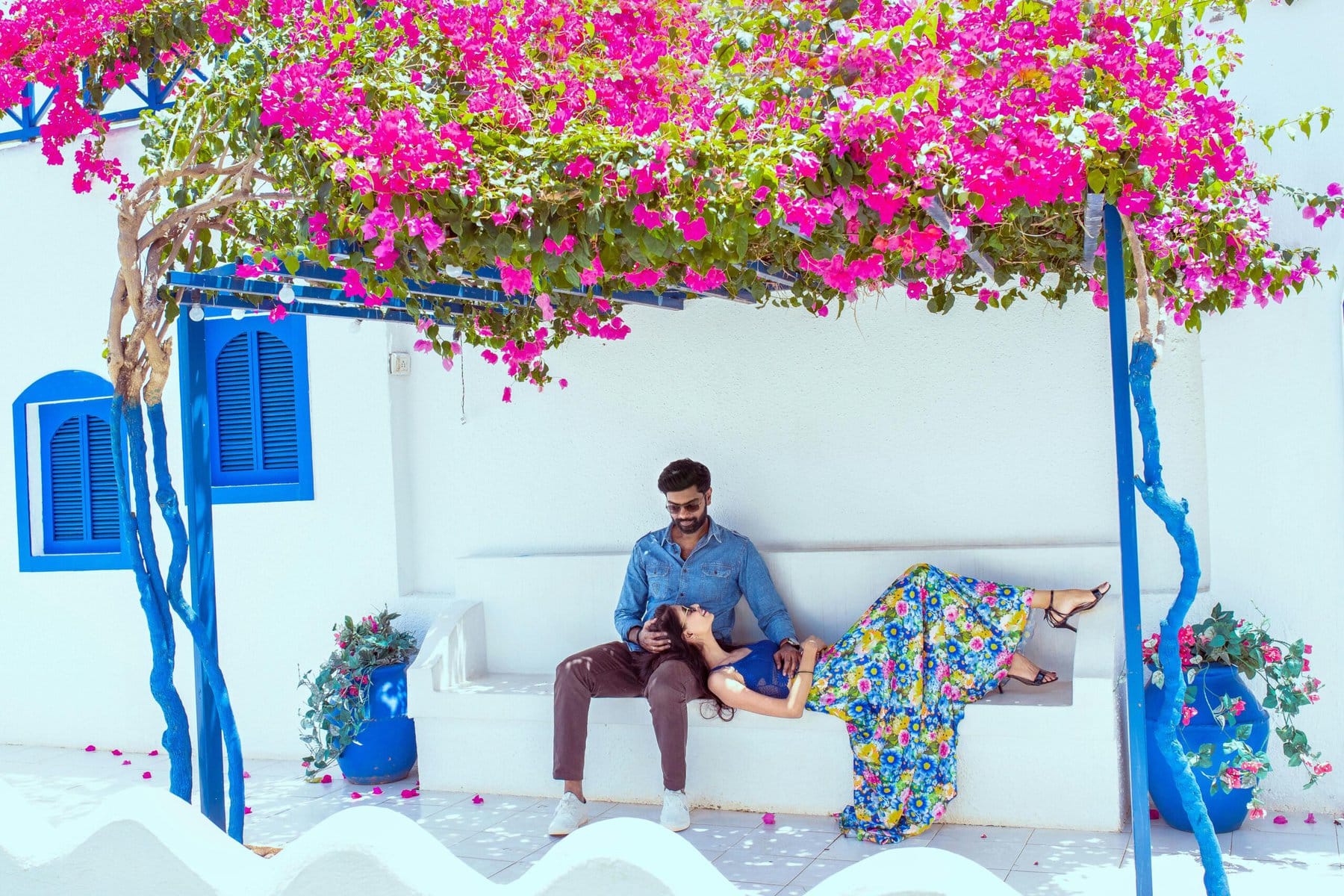
Greece Attire: Tips for Dressing Like a Local
Dressing like a local in Greece is all about striking the right balance between comfort, modesty, and style. By avoiding typical tourist attire and embracing the laid-back yet chic vibe of Greek fashion, you’ll blend in seamlessly with the locals and enhance your travel experience in this beautiful Mediterranean destination.
Here are some tips on how to make sure your Greece attire blends in:
Say No to Shorts and Sneakers
While comfortable for sightseeing, shorts and sneakers are a dead giveaway that you’re a tourist. Instead, opt for lightweight trousers or a breezy skirt paired with stylish sandals. Not only will you blend in better, but you’ll also be prepared for impromptu visits to historical sites or churches, where modest attire is often required.
Dress Respectfully for Religious Sites
Greece is home to many stunning churches and monasteries, where modest dress is expected out of respect for religious customs. Avoiding revealing clothing and opting for longer sleeves and trousers or skirts is key when visiting these sacred sites. A lightweight scarf or shawl can also come in handy for covering shoulders if needed.
Go for Light, Breathable Fabrics
With Greece’s warm climate, comfort is essential. Choose clothing made from breathable fabrics like cotton, linen, or lightweight blends to stay cool and comfortable throughout the day. Flowy dresses, loose shirts, and airy trousers are perfect for embracing the relaxed vibe of Greek fashion.
Add a Touch of Mediterranean Flair with Accessories
Accessories can elevate any outfit and add a touch of Greek charm. Consider incorporating accessories like woven straw hats, colourful scarves, or statement jewellery featuring traditional Greek motifs. These small details can instantly transform your look and help you blend in with the locals.
Keep it Simple and Elegant
Greek fashion is all about effortless elegance. Keep your outfits simple yet stylish, opting for classic pieces in neutral tones or soft pastels. Embrace minimalist silhouettes and avoid overloading your look with too many accessories or bold patterns. Remember, less is often more when it comes to mastering the art of Greek style.
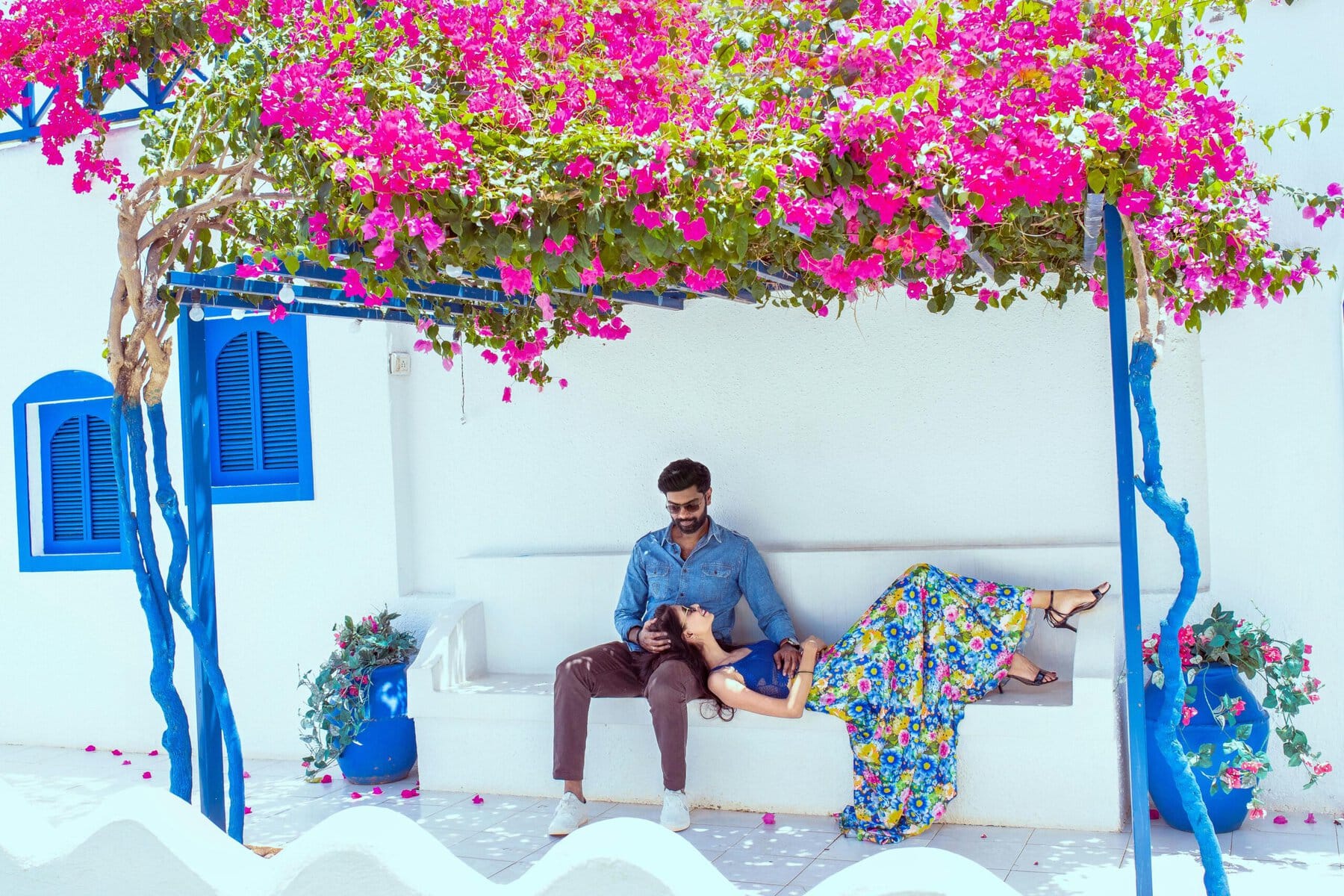
Must-Have Pieces for Your Greece Attire
Getting ready for your Greek adventure means packing smart clothes that keep you comfy and looking good. Here are five Greece attire essentials for both men and women:
Light Tops and Bottoms
Take along light shirts and trousers made from airy fabrics like cotton or linen. These clothes keep you cool in the Greek heat and can be dressed up or down easily.
Stylish Sandals or Shoes
Choose sandals or loafers instead of heavy shoes. Leather ones are classy and perfect for exploring. Make sure they’re comfy for walking around.
Sun Protection Gear
Make sure to protect yourself from the sun, ideally with a wide-brimmed hat and sunglasses. They’re not just for protection—they add a cool touch to your outfit too.
Light Layers for Chilly Evenings
Nights can get cool, so bring along a light jacket or a casual shirt. They’ll keep you warm without weighing you down, great for nights out.
Beach Stuff
Don’t forget your swimwear and beach gear! Pick colourful swim shorts or bikinis, and grab a towel and a bag for your stuff. Comfy flip-flops or sandals are a must for sandy strolls.

Greece Attire for Different Seasons
If you dress appropriately for the weather, you can effortlessly blend in with the locals and enhance your travel experience in Greece.
What to Wear in Greece to Not Look like a Tourist in the Summer (June to August)
Summer in Greece is hot and dry, with temperatures often soaring above 30°C (86°F). Bring light, breathable clothing to stay cool in the scorching sun. Here’s what to pack:
- Men: Shorts, lightweight T-shirts, swim shorts, sandals, sunglasses, wide-brimmed hat, breathable socks, sunscreen.
- Women: Sundresses, skirts, lightweight tops, swimwear, sandals, sunglasses, wide-brimmed hat, lightweight scarf, sunscreen.
What to Wear in Greece to Not Look like a Tourist in Autumn (September to November)
Autumn in Greece brings cooler temperatures and occasional rain showers. Days are mild, and temperatures range from 15°C to 25°C (59°F to 77°F). Pack layers and waterproof gear for changing weather conditions throughout September to November. Here’s what to include:
- Men: Jeans or trousers, long-sleeved shirts, lightweight jacket, waterproof coat, closed-toe shoes, umbrella, warm socks.
- Women: Jeans or trousers, long-sleeved tops, cardigan or sweater, lightweight jacket, waterproof coat, closed-toe shoes, umbrella, scarf.
What to Wear in Greece to Not Look like a Tourist in the Winter (December to February)
Winter in Greece is mild but damp, with temperatures averaging between 5°C and 15°C (41°F to 59°F). Bring warm clothes and waterproof gear to stay comfortable. Here’s what to pack:
- Men: Jeans or trousers, sweaters or jumpers, waterproof jacket, scarf, gloves, beanie, closed-toe shoes, thermal socks.
- Women: Jeans or trousers, sweaters or jumpers, waterproof jacket, scarf, gloves, beanie, closed-toe shoes, thermal socks.
What to Wear in Greece to Not Look like a Tourist in the Spring (March to May)
Spring in Greece sees temperatures rising and flowers blooming. Days are mild, with temperatures ranging from 10°C to 20°C (50°F to 68°F). Pack versatile clothing for changing weather. Here’s what to bring:
- Men: Jeans or trousers, T-shirts, light jacket, waterproof shoes, sunglasses, baseball cap, breathable socks.
- Women: Jeans or trousers, T-shirts, light cardigan or jacket, waterproof shoes, sunglasses, wide-brimmed hat, lightweight scarf.
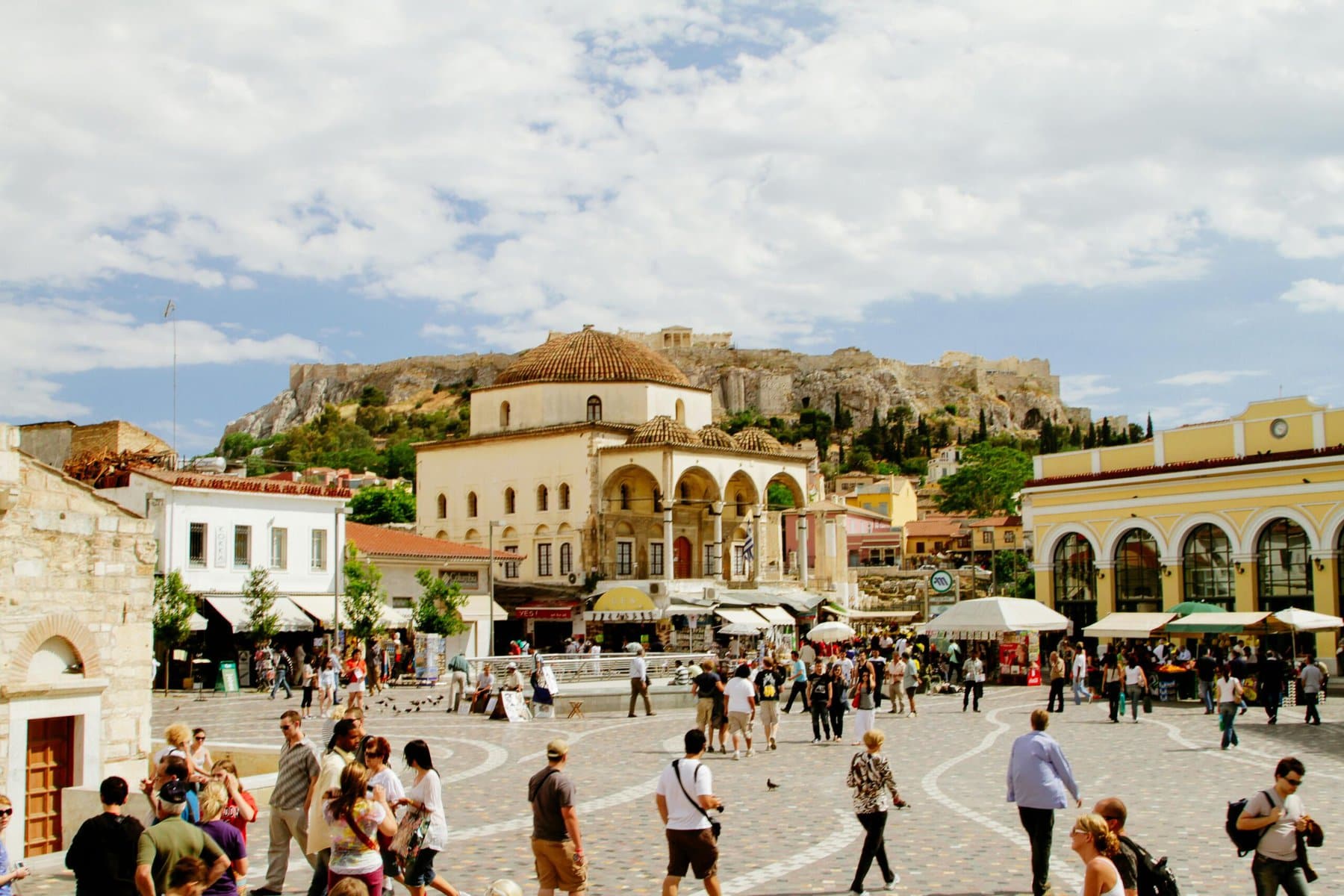
Greece Attire Shopping Recommendations
When it’s time to indulge in some retail therapy in Greece, you’re spoiled for choice, especially when it comes to clothing and accessories. Here’s where to find the best fashion finds for your Greece attire:
Local Markets
Lose yourself in the lively vibes of local markets, where you’ll discover a treasure trove of clothing and accessories. Athens’ Monastiraki Flea Market and Thessaloniki’s Modiano Market are bustling hubs offering everything from vintage threads to handmade jewellery.
Boutique Stores
For a touch of luxury and exclusivity, boutique stores in Greece are the way to go. Wander the charming streets of Mykonos Town or Santorini’s Oia village, where chic boutiques showcase Greek designers and international brands.
Popular Shopping Districts
Greece’s cities are home to vibrant shopping districts, perfect for fashion-forward travellers. Athens’ Kolonaki neighbourhood is a haven for designer labels, while Ermou and Monastiraki streets offer a mix of local and international fashion.
Island Boutiques
Don’t forget to explore the island boutiques for unique fashion finds infused with Mediterranean charm. From Rhodes to Crete, each island boasts its own style, with shops offering everything from beachwear to bohemian chic.
Artisan Workshops
For a truly authentic shopping experience, seek out artisan workshops where local craftsmen create handmade clothing and accessories. From leather sandals to woven textiles, these artisanal pieces embody the essence of Greek craftsmanship.
With so many shopping options to explore, Greece promises a fashion-filled adventure like no other. So, embrace your inner fashionista, hit the streets, and indulge in some stylish finds to elevate your wardrobe with a touch of Greek flair.
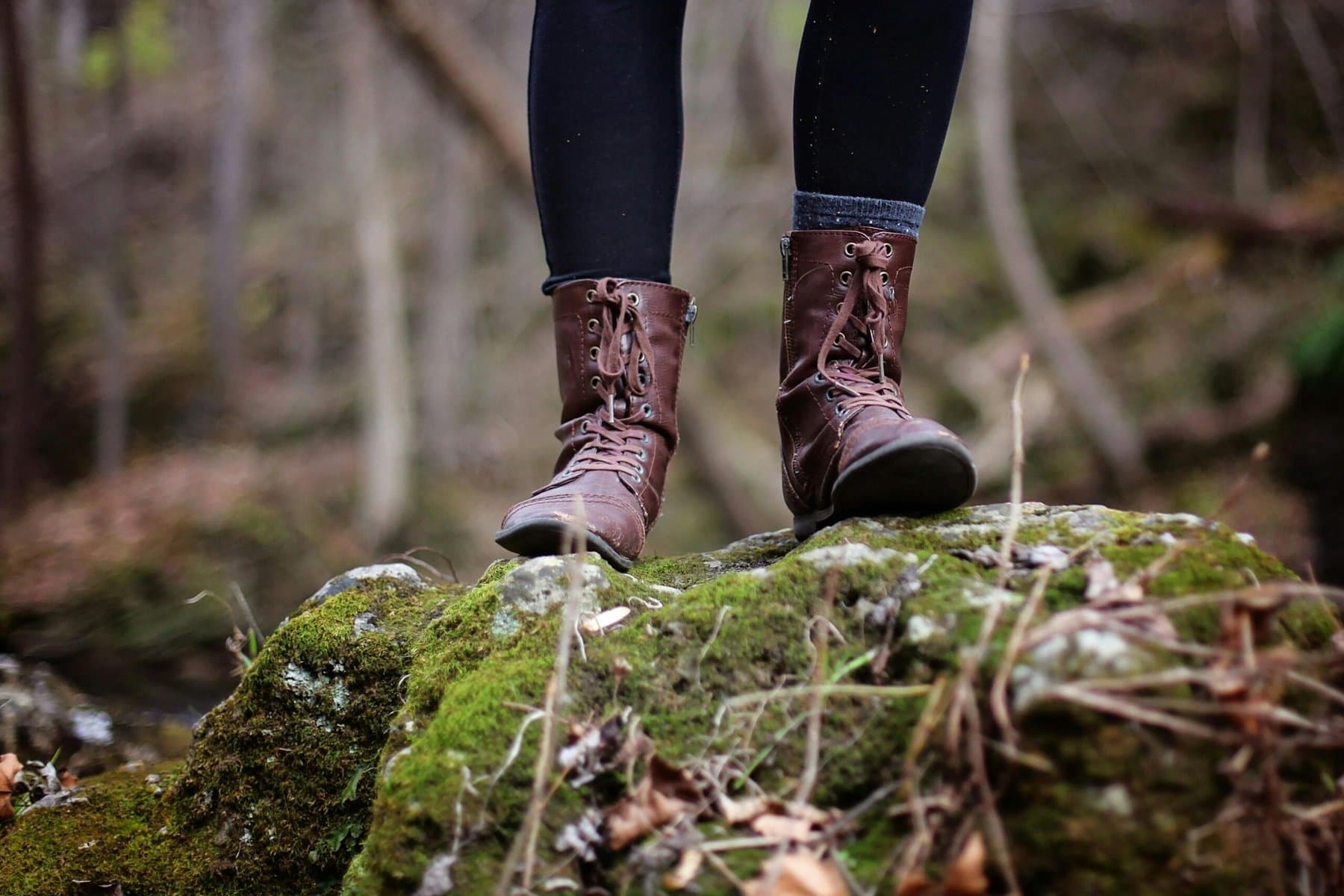
Footwear Guide
Choosing the right footwear for your Greek adventure is important for both comfort and style. Here’s your go-to guide for selecting the perfect shoes for different activities and terrains in Greece:
Exploring Ancient Ruins
When exploring ancient sites like the Acropolis or Delphi, go for comfortable and supportive shoes with good grip. Closed-toe walking shoes or lightweight hiking sandals are ideal for navigating uneven terrain and climbing stairs.
Avoid flip-flops or flimsy sandals, as they may not provide enough support on rocky surfaces.
Strolling Along Sandy Beaches
For leisurely strolls along Greece’s beautiful beaches, choose sandals or flip-flops with sturdy straps and non-slip soles.
Look for water-friendly options made from quick-drying materials, which are perfect for beach hopping and dipping your toes in the crystal-clear waters of the Aegean or Ionian Sea.
Avoid wearing trainers or closed-toe shoes on the beach, as sand can quickly get trapped inside and cause discomfort.
Hiking and Outdoor Adventures
If you’re planning to explore Greece’s rugged landscapes and hiking trails, invest in a pair of sturdy hiking boots or trail shoes.
Look for footwear with ankle support, durable outsoles, and waterproof features to keep your feet dry and protected, especially if you’ll be trekking through forests or mountainous terrain. Lightweight and breathable options are also available for less challenging hikes.
City Sightseeing and Urban Exploration
For city sightseeing and exploring Greece’s bustling streets and cultural landmarks, choose comfortable walking shoes or stylish sneakers.
Go for breathable materials and cushioned insoles to keep your feet happy during long days of sightseeing. Look for versatile styles that can easily transition from day to night, allowing you to explore ancient ruins by day and enjoy dinner at a trendy rooftop bar by night.
Dining Out and Evening Events
When dressing up for dinner at a seaside taverna or attending an evening event in Greece, you can spice up your look with a pair of chic sandals or dressy flats for women, and smart loafers or leather shoes for men.
Choose footwear that complements your outfit and reflects the relaxed yet sophisticated vibe of Greek style. Avoid overly casual or athletic footwear, as they may appear out of place in more formal settings.
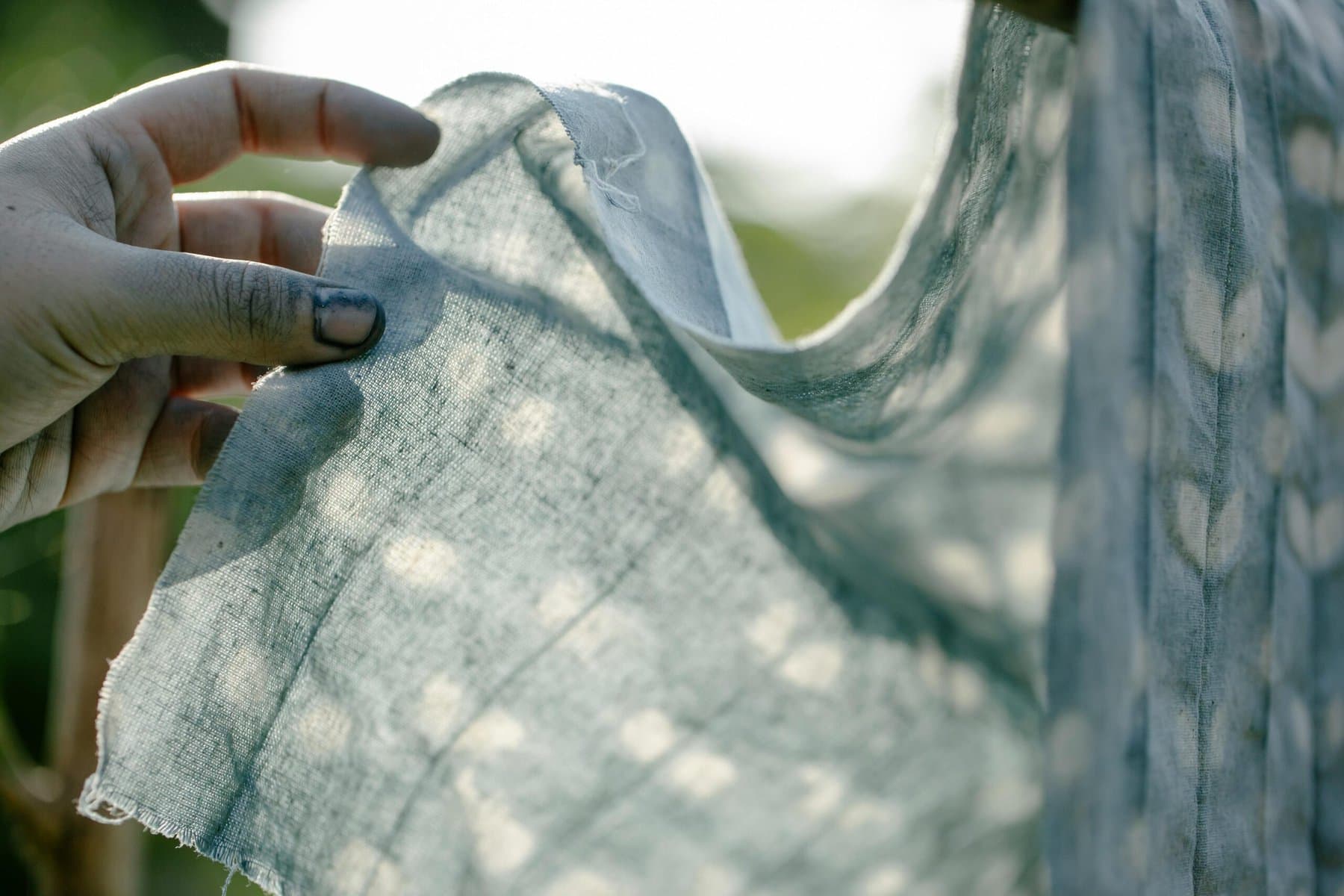
Travel-Friendly Fabrics for Greece Attire
Choosing the right fabrics for your Greece attire can make your journey smoother and more enjoyable. Let’s talk about why travel-friendly fabrics are a great choice:
No Wrinkles
Wrinkle-resistant fabrics, such as polyester blends or special types of cotton, are a boon for travellers. They have a knack for staying smooth, even after being stuffed into your suitcase.
This means less time spent ironing and more time soaking in the sights and sounds of Greece without worrying about crumpled clothes.
Quick-Drying
Imagine spending a day at the beach or hiking through Greece’s stunning landscapes. Quick-drying fabrics, like nylon or polyester, are your best bet for staying comfortable.
These materials are designed to wick away moisture and dry rapidly, so you won’t stay soggy after a swim or a sweaty trek. You can enjoy your outdoor adventures to the fullest, knowing that your clothes will dry in a flash.
Stay Cool
Greece’s Mediterranean climate can be scorching, especially during the summer months. That’s where breathable fabrics like cotton or linen come in. These materials allow air to circulate, keeping you cool and comfortable even in the heat.
Choosing clothes made from these travel-friendly fabrics not only simplifies your packing but also guarantees you’re prepared for whatever adventures come your way in Greece. So, pack smart, stay comfortable, and get ready to make unforgettable memories in Greece!
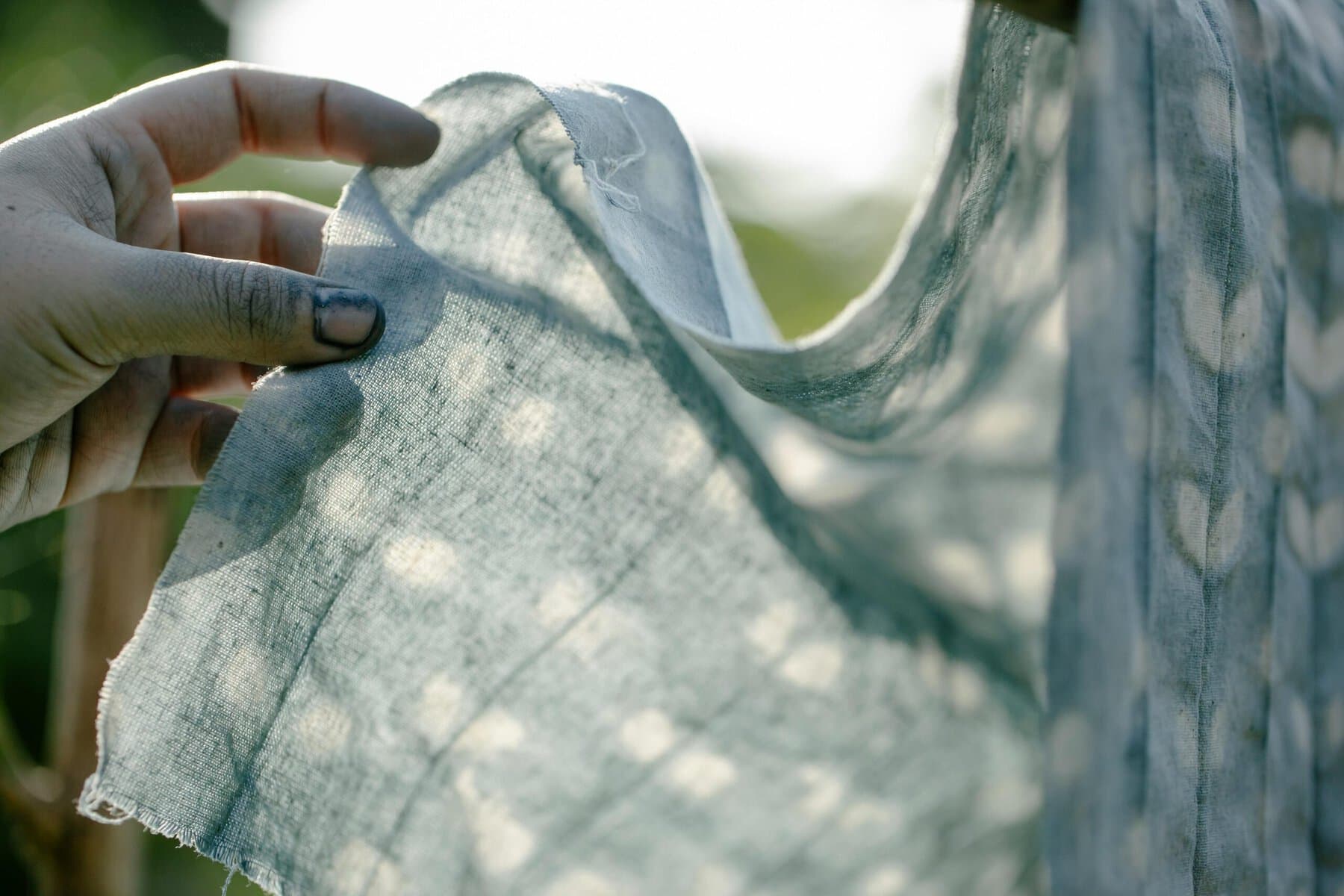
Cultural Etiquette for Greece Attire
Understanding Greek cultural norms and etiquette related to your Greece attire and appearance shows respect for local customs. Here are some insights to help you navigate social situations with ease:
Dressing for Dining Out
When dining at restaurants in Greece, especially in upscale establishments or family-owned tavernas, it’s important to dress appropriately. While casual attire is generally acceptable for most eateries, go for smart-casual attire for finer dining experiences.
Men can wear trousers or smart jeans paired with a collared shirt, while women can wear dresses, skirts, or tailored trousers with a blouse or stylish top. Avoid wearing beachwear or overly revealing clothing, as it may be considered disrespectful.
Attending Social Events
Whether you’re invited to a wedding, festival, or religious celebration, you need to dress appropriately for the occasion.
For formal events, such as weddings or religious ceremonies, men should wear suits or smart trousers with a dress shirt and tie, while women can wear elegant dresses or tailored separates.
For more casual gatherings, such as street festivals or family gatherings, smart-casual attire is appropriate. Remember to dress modestly and respectfully, especially when visiting religious sites or participating in cultural events.
Beachwear Etiquette
While Greece’s beautiful beaches may tempt you to spend all day soaking up the sun, it’s important to be mindful of beachwear etiquette. When heading to the beach, wear appropriate swimwear such as bikinis or swim shorts, but cover up when walking to and from the beach.
Consider bringing a cover-up or sarong to wear over your swimwear when leaving the beach area to respect local customs. Additionally, avoid going barefoot in restaurants or shops after visiting the beach, and always shake off excess sand before entering indoor spaces.
Respect for Religious Sites
Greece is home to numerous historic churches, monasteries, and archaeological sites, many of which hold religious significance. When visiting these sites, dress modestly out of respect for the religious and cultural traditions of the Greek Orthodox Church.
Both men and women should cover their shoulders and knees, so consider wearing long trousers, skirts, or dresses and bringing a shawl or scarf to cover exposed skin if necessary. Avoid wearing hats or sunglasses inside religious buildings, and refrain from loud or disruptive behaviour.

Packing Essentials Beyond Greece Attire
Preparing for a trip to Greece requires careful planning to ensure you have everything you need for a comfortable and stylish adventure. Here’s a comprehensive packing checklist to help you pack like a pro:
Clothing
- Lightweight tops and T-shirts for hot summer days.
- Shorts and skirts for aying cool in the Mediterranean heat.
- Dresses for both casual outings and evening dinners.
- Long trousers or jeans for cooler evenings and cultural visits.
- Swimwear for beach days and hotel pools.
- Lightweight jacket or cardigan for cooler temperatures.
- Comfortable walking shoes or sandals for exploring ancient ruins and city streets.
- Smart-casual shoes for dining out and evening events.
- Underwear and socks for everyday wear.
Accessories
- Sunhat or wide-brimmed hat to protect yourself from the sun.
- Sunglasses with UV protection for the bright Mediterranean sunlight.
- Scarf or shawl for covering up in religious sites or chilly evenings.
- Lightweight backpack or crossbody bag for carrying essentials during day trips.
- Beach bag for carrying towels, sunscreen, and other beach essentials.
- Waterproof pouch or bag for storing valuables at the beach or on boat trips.
- Travel-size umbrella for unexpected rain showers.
Toiletries
- Sunscreen with high SPF to avoid getting sunburnt.
- Insect repellent for avoiding mosquitoes.
- Toiletry bag containing your toothbrush, toothpaste, shampoo, conditioner, and body wash.
- Travel-size hand sanitizer for on-the-go cleanliness.
- Basic first aid kit with plasters, pain relievers, and any necessary medications.
Electronics
- Mobile phone and charger for staying connected and capturing memories.
- Camera or GoPro for documenting your adventures.
- Portable power bank for recharging devices on the go.
- Travel adapter to ensure your electronics can be used with Greek outlets.
Miscellaneous
- Passport and travel documents, including copies stored securely.
- Travel insurance details and emergency contact information.
- Currency or debit/credit cards for making purchases.
- Guidebook or map for navigating local attractions and activities.
- Reusable water bottle for staying hydrated.
- Snacks for energy boosts during long days of sightseeing.
By packing these essentials, you’ll be well-equipped for a comfortable and stylish trip to Greece. Remember to pack light and leave room in your luggage for any souvenirs or treasures you may find along the way. Happy travels!
Wrapping Up: Planning Your Greece Attire
Now that you know what to wear in Greece to not look like a tourist, you’re all set for an unforgettable adventure complete with stylish Greece attire. With your fashion-forward approach and travel-savvy packing, you’re sure to make the most of your Greek getaway!
Have you been to Greece before? What were some of the clothes you brought with you on your trip? Let me know in the comments.
Safe travels!

